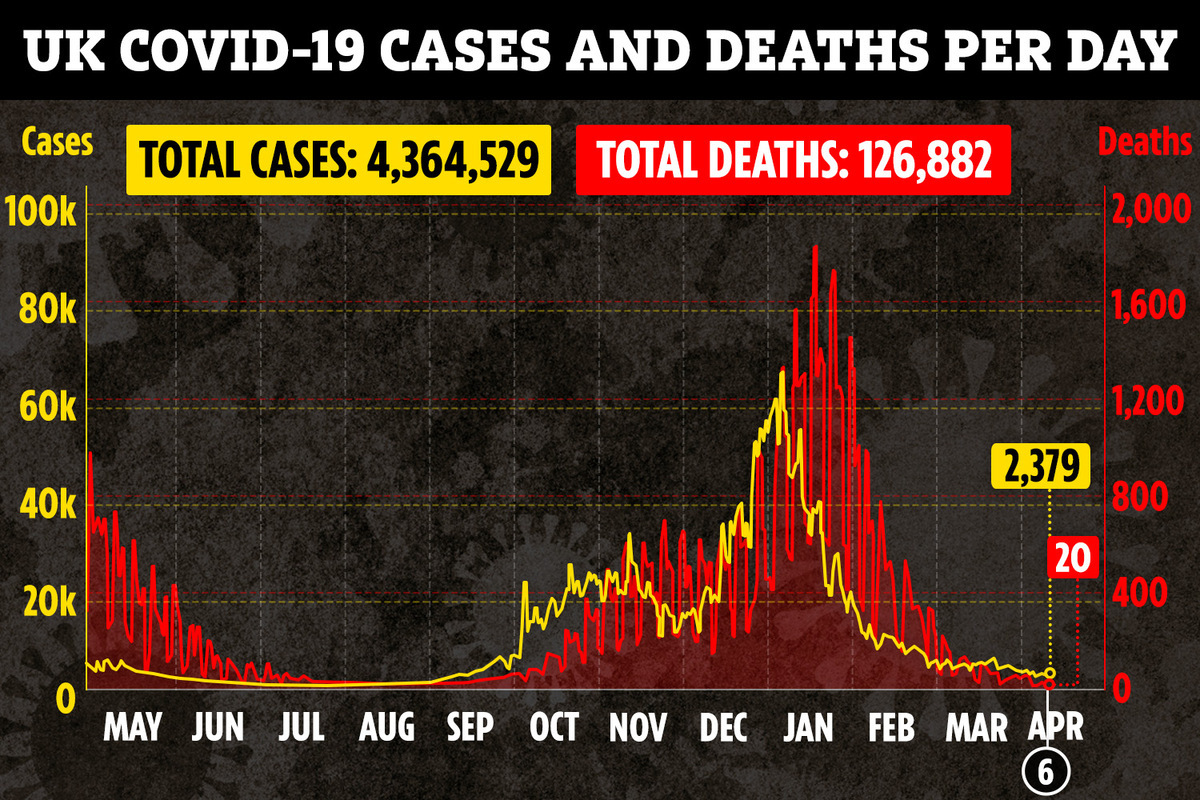THE family of a solicitor who died of a blood clot on the brain less than three weeks taking the AstraZeneca vaccine have urged Brits to “keep saving lives” by taking the jab.
Neil Astles, 59, died on Easter Sunday after getting his first dose of the Oxford/ AstraZeneca jab on March 17, The Telegraph reports.

Read our coronavirus live blog for the latest news & updates…
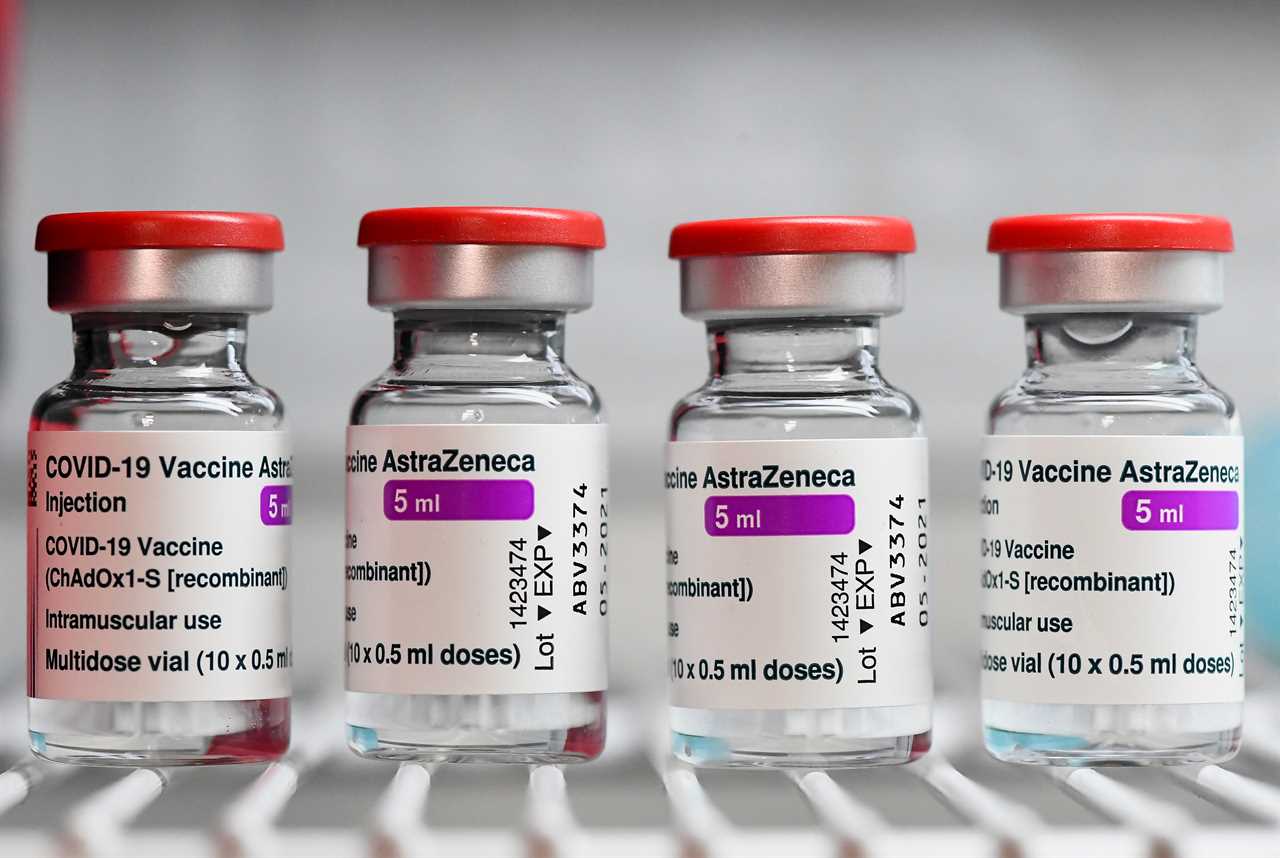
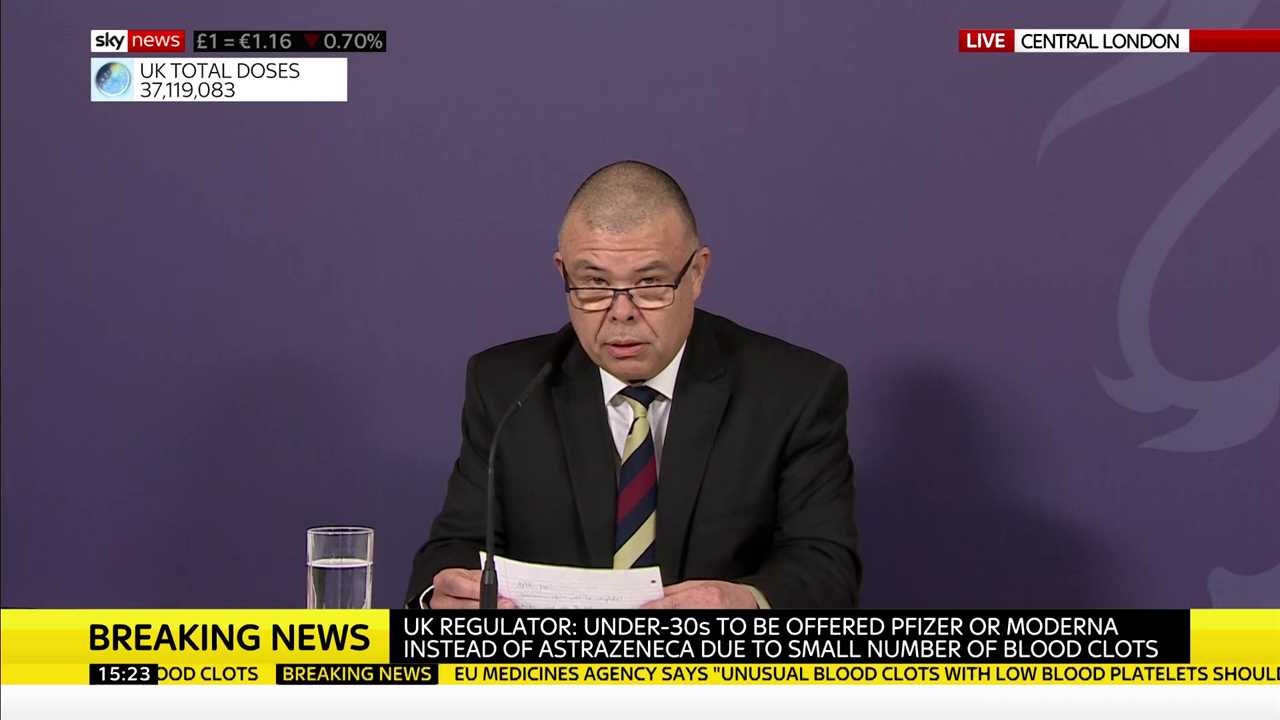
He had suffered headaches and loss of vision over 10 days before dying in hospital.
The married solicitor from Warrington, Cheshire, is the first person named in the UK suspected to have died after developing side-effects that have been linked to the AstraZeneca jab.
His sister, Dr Alison Astles, said the family were “furious” but called on Brits to carry on taking the AstraZeneca vaccine as “fewer people will die”.
She said her brother had been “extraordinarily unlucky”.
ONE IN A MILLION CHANCE OF DEATH
It comes after the UK’s medicine regulator said that under-30s should be offered an alternative to the AstraZeneca Covid vaccine after blood clots fears.
Out of the 79 cases reported in the UK, 51 women and 28 men suffered with clotting issues – all from the first dose.
The chance of dying from a blood clot after having the AZ jab in the UK is about one in one million – after 19 died from around 20million vaccinations.
Of those 19 deaths, three were people under the age of 30.
Brits aged 18-29 will be given the option of having an alternative jab such as Pfizer or Moderna, The Joint Committee on Vaccination and Immunisation (JCVI) recommended.
Dr Astles, the subject lead for pharmacy at the University of Huddersfield called on people to continue going for the AstraZeneca jab despite her brother’s death.
She told The Telegraph: “Despite what has happened to our family, we strongly believe that everyone should go for their first and second doses of the AstraZeneca vaccine.
“Emotionally we are completely and utterly furious. We are suffering. But there’s nothing in our minds to be really furious about. My brother was just extraordinarily unlucky.
“If we all have the vaccine, a few of us might have a blood clot, but the evidence is that fewer people will die.
“We trust the process, we trust the regulator, and despite what has happened to our family, we don’t want people to be scared off. That’s the message we want to get across.”
Dr Astles said her brother began feeling ill about a week after having his first dose of the AstraZeneca vaccine on March 17.
Mr Astles was fit and healthy with no history of blood clotting issues, but developed from headaches and loss of vision in his right eye.
Dr Astles said: “And then on Friday night, his symptoms had become a great deal worse. And my other brother took him to A&E.
“At three o’clock the next morning, they transferred him over to the Royal Liverpool hospital to ICU.
“There was a strong suspicion right from the very beginning that it was the Astra vaccine because of his very low platelet levels.
“So he had a clot and a subsequent bleed on his brain, which was compressing his brainstem.
“He was probably brain dead on Saturday afternoon, but he was declared dead at 22 minutes past five on Sunday evening, when they turned off his ventilator.
“We were all around him at that point. The clot just compressed his brainstem such that his breathing wouldn’t function.”
The coroner had not yet reported the official cause of death, she said.
Dr Astles added: “What appears to have happened is the vaccine has caused his immune system to turn against his body.
“And his body has reacted by forming a clot which then resulted in a subsequent bleed in his brain.”
‘EXTREMELY SMALL’ RISK
She called on people who get the AZ jab and develop headaches to get it checked out and urged pharmacists to be vigilant.
“My brother went to the pharmacy, but the pharmacist gave him some anti-sickness medicine,” she said.
“As a pharmacist myself, I very strongly want all pharmacists to be asking people presenting with headaches or sickness: have you had a Covid vaccine within the last three weeks?”
Dr June Raine, Chief Executive for the MHRA, said the “risk remains extremely small” despite “evidence firming” up of links between jabs and blood clots.
She said anyone who has already had a first dose of AstraZeneca should still get their second, unless they suffered with clotting issues.
But all Brits under 29 with no health issues will be offered an alternative vaccination when their slot comes.
Professor Wei Shen Lim, Covid-19 Chair for JCVI, said: “Safety remains our number one priority.
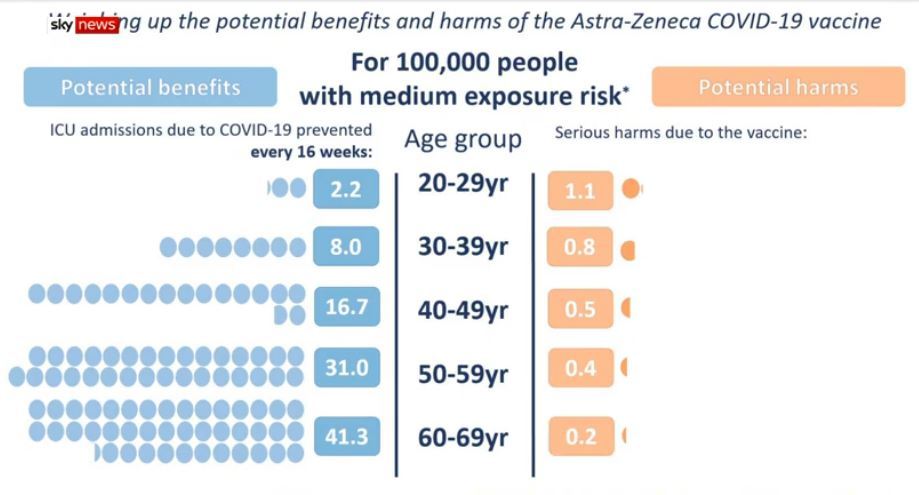
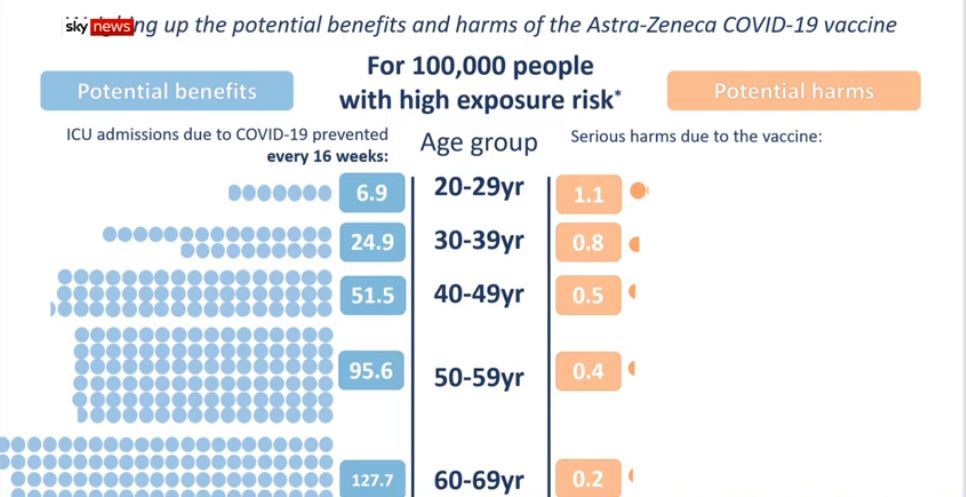
“Based on the available data and evidence, JCVI has advised that it is preferable for adults aged under 30 with no underlying conditions to be offered an alternative to the AstraZeneca vaccine where available.
“This weighs up the risks of being seriously ill or dying from Covid-19 against the extremely small risk of a serious adverse event.
“The Covid-19 vaccines have already saved thousands of lives and the benefit for the majority of the population is clear – if you are offered a vaccine, you should take it.”
He added the change in preference for 18-29 year olds is out of “caution”.
Experts had earlier suggested the rollout to under-50s should also be halted amid fears of the unusual side-effects, but concern is largely for younger people.
Today Prime Minister Boris Johnson said he will carefully follow the advice on the Oxford/AstraZeneca vaccine from the MHRA and JCVI but does not believe he will have to alter the schedule for easing the lockdown.
During a visit to Cornwall, he said: “I think the crucial thing on this is to listen to what the scientists, and the doctors, the medical experts, have to say.
“The MHRA is meeting, the JCVI is meeting, they’ll be setting out the position and we will get on with rolling out the vaccine and obviously we’ll follow very carefully what they have to say.
“I don’t think anything that I have seen leads me to suppose that we will have to change the road map or deviate from the road map in any way.”
He added on the vaccination programme: “You can really start to see some of the benefits of that – it’s pretty clear that the decline in the number of deaths, the decline in the number of hospitalisations is being fuelled, is being assisted, the steepness of that decline is being helped by the roll-out of the vaccines so it’s very important for everybody to continue to get your second jab when you’re asked to come forward for your turn.”
Deputy Chief Medical Officer Jonathan Van-Tam said: “This is a change in clinical advice for under 30s.
“It will require some changes in the way NHS operationalises the vaccines roll-out programme, but I’ve spoken to colleagues in the NHS in some detail and am assured, because of our supply situation in relation to alternative vaccines, the effect on timing of overall programme should be zero or negligible.
“That, of course, is contingent upon getting the supplies we expect to get of alternative vaccines, Pfizer, which is in use now, and Moderna, that we hope to bring into deployment from mid-April.”
What are the symptoms to watch out for?
Symptoms of a possible blood clot are: Persistent headache, vision blurring, shortness of breath, chest pain, leg swelling, abdominal pain, unusual skin bruising or pin-point spots beyond the injection site.
Anyone who has symptoms four days after vaccination or more should seek prompt help.
The MHRA previously stressed the risk was “very small” and the benefits of the vaccines against Covid outweigh any risks”.
And the World Health Organisation (WHO) insisted there was “no link” between the jab and blood clots, with experts urging people to still get their vaccine.
Last night the University of Oxford paused trials of its AstraZeneca vaccine on children and teenagers over concerns of the risk in young people.
A probe has been launched to make sure the jab is completely safe before the trials restart.
Over than 31.6million adults have now had their Covid vaccine, as it looks likely Downing Street will hit the goal of jabbing all over-50s by April 15.
But fears over the link between the AZ vaccine and clots developing in younger people could see the speed of the rollout take a hit – although it is thought Moderna’s shot could instead be used primarily in people under 30.
It comes after Marco Cavaleri told Italy’s Il Messaggero newspaper on Tuesday: “In my opinion, we can say it now, it is clear there is a link with the vaccine. But we still do not know what causes this reaction.
What vaccines does the UK have?
In use:
- Oxford and AstraZeneca: 100 million doses ordered – currently only recommended for over-30s only
- BioNTech and Pfizer: 40 million doses ordered – currently being given to anyone eligible
- Moderna: 17 million doses ordered – currently being given to anyone eligible in Wales
On the way:
- Janssen: 30 million doses ordered – use expected from July
- Valneva: 100 million doses ordered
- Novavax: 60 million doses ordered
- GlaxoSmithKline (GSK) and Sanofi Pasteur: 60 million doses ordered
He added: “Among the vaccinated, there are more cases of cerebral thrombosis… among young people than we would have expected.”
Thirty cases of the rare blood clotting have been seen in the UK, as of April 2, of the Oxford vaccine.
Of those, 22 are the rare CVST kind of clot that caused concern in Europe, and eight were other thrombosis events.
That is out of 18.1million doses administered in the UK – making it extremely rare at around one in 600,000.
Blood clots happen for a wide range of reasons, with around 3,000 people a month in the UK suffering them.
Even taking the contraceptive pill makes you two or three times more likely to develop a clot.
Prof Adam Finn, Professor of Paediatrics, University of Bristol said that more information needs to be given on the people who suffered with the blood clots and how their illnesses came about.
He said: “We are seeing another vaccine coming in (Moderna), and further vaccines are approaching licensure, and I know that the UK has made contracts for quite a wide range of different vaccines.
“As time goes forward, we will have much more flexibility about who can be offered what.

“On the other hand, we do need to keep the programme going if the plan to open things up and allow things to get back to normal is to proceed without another wave of the pandemic coming through.
“So it’s quite a tricky balancing act here, getting the balance right, getting vaccines coming through… getting the risk-benefit right for people coming forward.”
The UK has bought 17 million doses of the Moderna vaccine – enough for 8.5 million people.
Jabs are being given out at West Wales General Hospital in Carmarthen, with Elle Taylor, a 24-year-old unpaid carer for her grandmother, becoming the first UK citizen to receive the Moderna vaccine on Wednesday morning.
AstraZeneca’s tests on youngsters aged six to 17 years old were paused last night, while UK regulators investigate possible links to blood clots in young adults.
A senior government jabs adviser had argued earlier the vaccine rollout should be halted for younger people until regulators issue firm guidance on the Oxford/AstraZeneca jab’s safety.
And Dr Maggie Wearmouth, a member of the joint committee on vaccination and immunisation (JCVI), also suggested “slowing things down” entirely, until AZ is certain it’s jab fully safe.
She said: “The issue is about safety and public confidence. We don’t want to cover anything up that we feel that the public should be knowing.”
